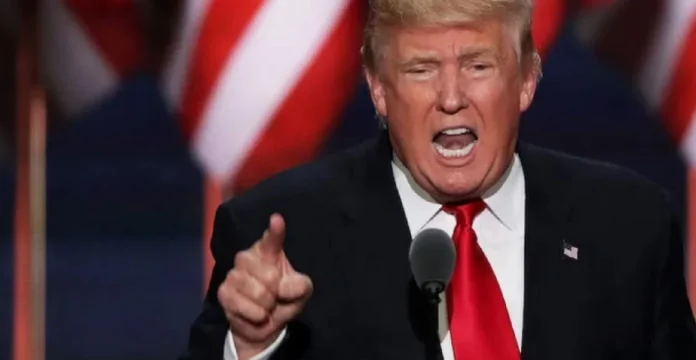By Kenneth Tiven
Donald Trump is America’s first “Hip Hop” president not in a musical sense, but in his ability to hop from one thought to another, seamlessly mixing fact and fiction to answer a reporter’s question or fire off a social media post. His behaviour on tariffs for trading nations is like watching someone cheat at cards while playing solitaire. Whatever his frustrations with Russian President Vladimir Putin, the solution is not extra tariffs for India because it buys Russian oil.
The latest Trump tariffs have just gone into effect, and price increases in America will shortly start to reflect the impact.
THE EPSTEIN FILES ERUPTION
The major issue now complicating Trump’s presidency relates to Jeffrey Epstein, the deceased sex-trafficker of young women who palled around with Trump in his pre-presidency years as a New York celebrity. The irony would be striking if Trump’s blitzkrieg against democracy were derailed by his past association with a man whose sexual appetite targeted very young girls.
Trump’s MAGA supporters believed his 2024 campaign promise to release files on multiple conspiracy issues—including Epstein’s mysterious source of money and his network of powerful friends. He promised to release government files to clear all the so-called “deep state” mysteries magnified by online speculation.
In the spring, US Attorney General Pam Bondi spoke openly about the Epstein files, privately indicating to some that Trump’s name appeared. Then, on July 3, the government abruptly announced the files contained “nothing of consequence”. Since then, anger among the most conspiracy-minded in Trump’s base has grown steadily.
BACKLASH FROM INSIDE THE BASE
Shockingly, a staunchly pro-Trump site, American Patriot Poll, posted: “The Deep State is at it again… The American people deserve the FULL TRUTH! What are they trying to hide? And WHO are they protecting?” Its one-question poll asked whether the Department of Justice should be forced to release all Epstein files immediately.
“THE TIMES THEY ARE A-CHANGIN’”
Bob Dylan’s 1963 protest song feels eerily relevant today:
Come senators, congressmen, please heed the call,
Don’t stand in the doorway, don’t block up the hall,
For he that gets hurt will be he who has stalled.
The battle outside ragin’ will soon shake your windows
And rattle your walls, for the times, they are a-changin’.
GERRYMANDERING AND POLITICAL HARDBALL
The Trump administration’s push to redraw congressional maps in Texas to favour Republicans became a flashpoint. Texas Democrats fled the state to deny the quorum needed to pass the plan, finding refuge in Chicago with Governor JB Pritzker’s protection, as Texas’ governor sought ways to forcibly return them.
By law, 435 US congressional districts each represent roughly 7,10,000 people. Redistricting every decade is meant to balance population changes—yet political manipulation ensures the lines are rarely fair.
AUTHORITARIAN DRIFT
Immigration enforcement under Trump has shown contempt for court oversight. Homeland Security actions have skirted legal norms, with federal judges calling their conduct “deplorable”. Georgetown law professor Stephen Vladeck warned: “Without government credibility, it’s going to be harder for the government to do anything in court—even ordinary things.”
ECONOMIC SPIN AND RETALIATION
When the Bureau of Labor Statistics revised job projections in ways that contradicted Trump’s public claims, he fired the agency’s senior manager—despite multiple built-in safeguards that make “rigging” the numbers nearly impossible.
New tariff rates—illogical to many economists—are already in effect, impacting global trade. Trump brags about the revenue, but the cost is borne by American consumers. In other words, tariffs are just taxes by another name.
TRUMP’S INDIA PLAY—TARIFFS, OIL, AND POLITICAL LEVERAGE
Donald Trump’s economic and foreign policy towards India in his current term has become a mix of transactional bargaining, public pressure, and headline-driven politics.
1. Tariffs as a blunt instrument
Trump’s latest tariff package does not spare strategic partners. India now faces new duties on key export categories, including certain steel products, textiles and electronics components.
- Impact on US consumers: Many of these goods are inputs for American manufacturing or popular retail products, meaning the cost will be felt domestically.
- Impact on Indian exporters: These sectors depend heavily on US market access. The sudden tariff hike disrupts supply chains and undermines ongoing trade talks.
For India, the move is perplexing—it comes despite India’s growing role in US-led Indo-Pacific strategy and supply chain diversification away from China. For Trump, however, tariffs are a political Swiss Army knife—useful for claiming “toughness” at home, regardless of the partner involved.
2. Jawboning on Russian oil
Trump’s public statements on India’s Russian oil purchases have been unusually pointed for a US president dealing with a strategic ally. While previous administrations raised the issue quietly in diplomatic backchannels, Trump has:
- Accused India of “helping Putin” by continuing imports.
- Floated the idea of linking trade concessions to India’s energy decisions.
- Ignored India’s consistent position: it buys discounted Russian crude to manage domestic fuel prices, and such imports do not violate any binding UN sanctions.
This jawboning is classic Trump—framing a complex geopolitical calculation as a zero-sum loyalty test.
3. The Bigger Picture
- Election optics: Criticizing India’s Russian oil trade plays well with Trump’s “tough on adversaries” messaging, even if the policy substance is thin.
- Bargaining leverage: Tariffs and public criticism give Trump chips to trade in future negotiations on defense sales, market access, or tech partnerships.
- Strategic risk: Overplaying tariffs and public pressure risks pushing India to deepen ties with other major economies, including Russia and China, undermining long-term US influence.
Bottomline: Trump’s India policy in this phase is less about coherent strategy and more about personal political theatre—using tariffs and public shaming to demonstrate dominance, even at the cost of straining a key partnership.
—The writer has worked in senior positions at The Washington Post, NBC, ABC and CNN and also consults for several Indian channels


